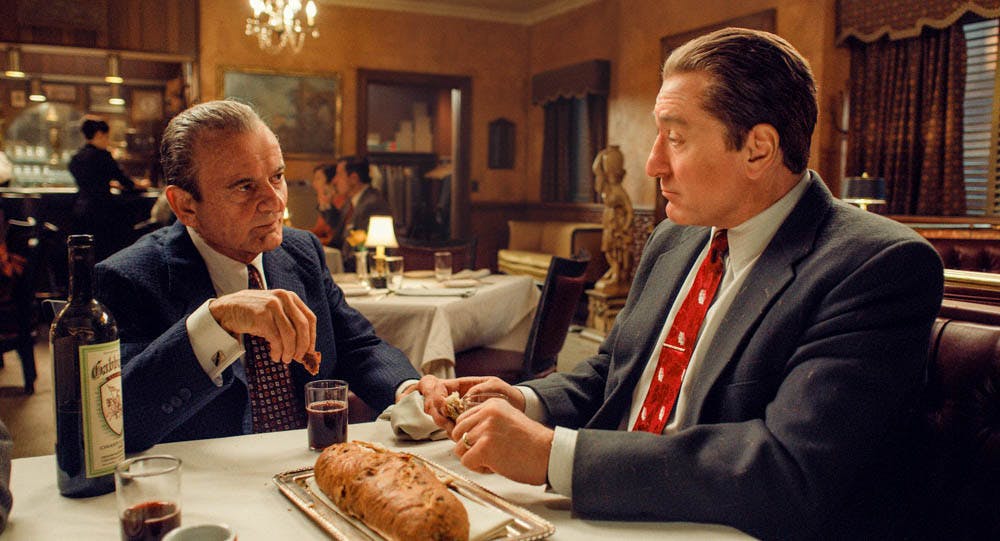On Nov. 27, renowned Italian-American filmmaker Martin Scorsese — known for films including “Goodfellas,” “Taxi Driver,” “The Departed” and “The Wolf of Wall Street”— made his Netflix debut with his newest film “The Irishman.” With an arduous runtime of three hours and 30 minutes, it is his longest film to date, as well as his most expensive. While the film has received high praise in the press, this success is not warranted.
“The Irishman” is based on the biography “I Heard You Paint Houses” about Frank Sheeran, played by Robert De Niro, a mob hitman for the Italian mafia in 1950s Philadelphia. Sitting in a wheelchair in a nursing home, Sheeran retells the bloodiest and goriest of his mafia glory days from a flashback perspective, finally relinquishing the truths he has kept under wraps for so many years.
Sheeran’s mafia career was sparked when he, as a humble truck driver, began to covertly sell his employer’s shipments to a local member of the Italian crime family. Sheeran quickly scales the ranks to become a top hitman and a trusted mafia name. Eventually, mafia leader Russell Bufalino, played by Joe Pesci, connects him with Al Pacino’s Jimmy Hoffa, the president of the International Brotherhood of Teamsters. Sheeran becomes a bodyguard of Hoffa and trustee of the union, which had deep financial ties to the mafia. During Sheeran’s service, Hoffa vanishes.
Up until this point, the plot is grounded in fact. Where it diverges from official records is Hoffa’s disappearance, which historically occurred on July 30, 1975. To this day, American authorities still have not definitively determined what happened — leaving a vacuum for countless conspiracy theories to arise. “The Irishman,” following “I Heard You Paint Houses,” paints Sheeran as Hoffa’s killer.
While boasting a riveting historic tale on paper, “The Irishman” stumbles in bringing these cunning betrayals, deep interpersonal connections and petty politics to life. Even after an ample 209 minutes, affinities and alliances somehow remain shallow. With the majority of the film comprised of huddled, male-to-male conversations at dark tables over glasses of whiskey, there is not much emotion nor interesting action that communicates the mafia’s complex and extreme interconnectedness.
Additionally, while the line “Based on a True Story” usually amplifies viewers’ interest and impressions of films, this film squanders that benefit. It overwhelms the audience with the random names and appearances of countless mafia members, all of whom die off. The film goes out of its way to portray the breadth of the mafia’s ties by writing out each character’s death date and how they were murdered next to their face, before proceeding to never bring up that same character again. While this intricate detailing does serve to contextualize the story against the backdrop of the greater mafia conglomerate, it simultaneously hinders and distracts the audience’s ability to keep track of the truly important characters.
Numerous faces and minuscule occurrences dilute the plotline, diverting the audience’s focus away from the film’s intentions. In such ways, according to a review from CheatSheet, “The Irishman” misses its mark as a crime epic and settles closer to “a history lesson.”
Additionally, “The Irishman” continues Scorcese’s track record of keeping male protagonists front and center. Throughout the film, Sheeran’s, Bufalino’s and Hoffa’s wives and daughters are painted as one-dimensional personas who are constantly present but never vocal. Bufalino’s wife Carrie, played by Kathrine Narducci, is portrayed as a posh and passive cigarette-addicted companion — nothing more, nothing less. Sheeran’s daughter, Peggy, played by Anna Paquin, resents Sheeran for joining the mafia and cuts ties with him forever once she reaches adulthood. But most of her dialogue consists of one-liners, like “thank you.” There is ultimately little exploration of the rifts that the weight of being in the mafia causes between men and their families. Such an allusion would have been refreshing and might have added a different dimension to the already all-too-familiar Hollywood trope of a mafia-centric plot.
While the film has earned high acclaim from critics with a Rotten Tomatoes score of 96 percent, the general public consensus is not as clear. Some viewers on Twitter have labeled it as “overrated,” “boring,” and “like a 3 1/2hr long speech,” while others praise it as one of the best films of the year. Ultimately, “The Irishman” is a story that evokes a strong reaction from all who make it to the end.





